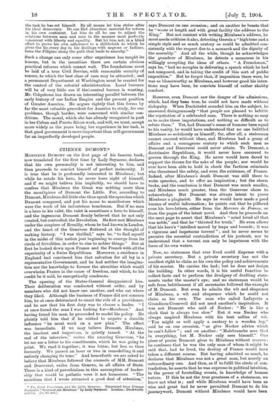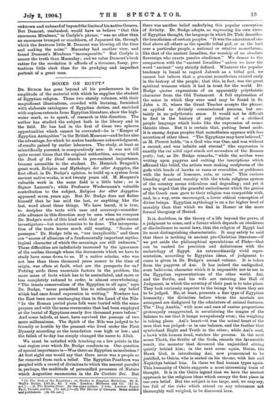ETIENNE DUMONT.*
MONSIEUR DUMONT on the first page of his famous book, now translated for the first time by Lady Seymour, declares that his own personality is not interesting to him, and then proceeds to convict himself of perfect insincerity. It is true that he is profoundly interested in Mirabeau ; but while he extols his hero, he never loses sight of himself, and if we might believe him implicitly, we should have to confess that Mirabeau the Great was nothing more than the mouthpiece of Dumont the Little. For, according to Dumont, Mirabeau did little else than speak the speeches which Dumont composed, and put his name to manifestoes which were the work of his industrious henchman. But if no man is a hero to his valet, the valet is sometimes a hero to himself, and the ingenuous Dumont firmly believed that he not only created, but controlled, the Revolution. He first met Mirabeau under the auspices of Romilly, whom he had known in London, and the heart of the Genevese fluttered at the thought of making history. "I was thrilled," says he, "to find myself in the midst of this nation just beginning to emerge from its circle of frivolities, in order to rise to nobler things." But at first he looked down upon France and the French with all the superiority of a Swiss Republican. Moreover, a residence in England had convinced him that salvation for all lay in a representative Government, and he had neither the imagina- tion nor the knowledge to foresee the atrocities which would overwhelm France in the cause of freedom, and which, to his credit be it said, he energetically condemns.
The opening of the States-General disappointed him. Their deliberation was conducted without order, and by members who did not know one another, and who sat where they liked. Although the business of France did not concern him, he at once determined to enact the role of a providence, and he saw that his first duty was to choose a leader. "1 at once found the man I was looking for—Mirabeau." And having found his man, he proceeded to model his policy. He plainly told him that if he wished to acquire a durable influence "he must work on a new plan." The effect was immediate. If we may believe Dumont, Mirabeau, the insolent and imperious, is quietly tamed. "At the end of the interview," writes the amazing Genevese, "he let me see a letter to his constituents, which he was going to print. We read it together ; it was bitter, but less so than formerly. We passed an hour or two in remodelling it and entirely changing its tone." And henceforth we are asked to believe that Mirabeau followed the counsels of MM. Dumont and Duroverai, exiles from Geneva, in all affairs of State. There is a kind of parochialism in this assumption of leader- ship that would be pathetic were it not humorous. "The exordium that I wrote attracted a good deal of attention,"
* The Great Frenchman and the Little Genevese. Translated from Etienne Dumont's "Souvenir Bur Mirabeau" by Lady Seymour. London : Duckworth and Co. [Ts. 6d. net.]
says Dumont on one occasion; and on another be boasts that he "wrote at length and with great facility the address to the King." But not content with writing Mirabeau's address, he must needs criticise it also, detecting therein a" high tone and a simple style and as much oratory as could be admitted con- sistently with the respect due to a monarch and the dignity of the assembly." And all the while, though he acknowledges the grandeur of Mirabeau, he detects a meanness in his willingly accepting the ideas of others. "A Frenchman," says he, "had no scruples in delivering a speech which he had not composed, and in taking the credit of this sort of public imposition." But he forgot that, if imposition there were, he was as blameworthy as Mirabeau, and however good his inten- tions may have been, he convicts himself of rather shabby conduct.
However, even Dumont saw the danger of his admissions, which, had they been true, he could not have made without disloyalty. When Duchhtelet sounded him on the subject, he answered disingenuously "that people are pleased to belittle the reputation of a celebrated man. There is nothing so easy as to make these imputations, and nothing so difficult as to refute them." Yet, had Dumones sense of humour been equal to his vanity, he would have understood that no one belittled Mirabeau so sedulously as himself; for, after all, a statesman cannot succeed without ideas, and Mirabeau had a grasp of affairs and a courageous oratory to which such men as Dumont and Duroverai could never attain. To Dumont, a doctrinaire Republican, it would never have occurred to govern through the King. He never would have dared to support the throne for the sake of the people ; nor would he ever have been able to hold in check the factious criminals who threatened the safety, and even the existence, of France. Indeed, after Mirabeau's death Dumont was still there to write speeches, and to offer an inspiration ; but the storm broke, and the conclusion is that Dumont was much smaller, and Mirabeau much greater, than the Genevese chose to acknowledge. But Dumont was always intent to prove Mirabeau a plagiarist. He says he would have made a good bureau of useful information ; he points out that he pilfered even his love-letters, either from the Mercure de France, or from the pages of the latest novel. And then he proceeds on the next page to assert that Mirabeau's "mind loved all that was noble," and that he "thirsted for truth." He even allows that his hero's "intellect moved by leaps and bounds ; it was a vigorous and impetuous torrent " ; and he never seems to perceive the essential contradiction of his portrait, nor to understand that a torrent can only be impetuous with the force of its own waters.
Now, no statesman that ever lived could dispense with a private secretary. But a private secretary has not the smallest right to claim as his own the policy and achievements of his master. He carries the hod ; but he does not design the building. In other words, it is his useful function to collect facts and to perform the drudgery of drafting state- ments under the master's eye; and no statesman would be sale from belittlement if all secretaries followed the example of M. Burnout. But even he admits the wit and eloquence of Mirabeau, a wit and eloquence which he could not claim as his own. The man who called Lafayette a Grandison-Cromwell did not need another's inspiration. It was not Dumont who said of Necker : "He is like a clock that is always too slow." But it was Necker who always inspired Mirabeau with his best sallies of wit. "You might as well apply a cautery to a wooden leg," said he on one occasion, "as give Necker advice which he can't follow " ; and on another : " Malebranche sees God in everything, but M. Necker only sees himself." One piece of praise Burnout gives to Mirabeau without reserve ; he confesses that he was the only man of whom it might be said that, had he lived, the destiny of France would have taken a different course. But having admitted so much, he declares that Mirabeau was not a great man, but merely an extraordinary one. And then, as if to fulfil the circle of con- tradiction, he asserts that he was supreme in political intuition, in the power of foretelling events, in knowledge of human nature. If this be not the true greatness of a statesman, we know not what is ; and while Mirabeau would have been as wise and great had he never permitted Dumont to do his journeywork, Dumont without Mirabeau would have been unknown and unheard of beyondthe limits of his native Geneva. But Dumont, unabashed, would have us believe "that this enormous Mirabeau," in Carlyle's phrase, "was no other than an enormous trumpet or coachhorn, of Japanned tin, through which the dextrous little M. Dumont was blowing all the time and making the noise." Macaulay had another view, and found Dumont's Mirabeau "incomparable." But Carlyle is nearer the truth than Macaulay ; and we value Dumont's book rather for the revelation it affords of a tiresome, fussy, pre- tentious little clerk than for its grudging and imperfect portrait of a great man.















































 Previous page
Previous page